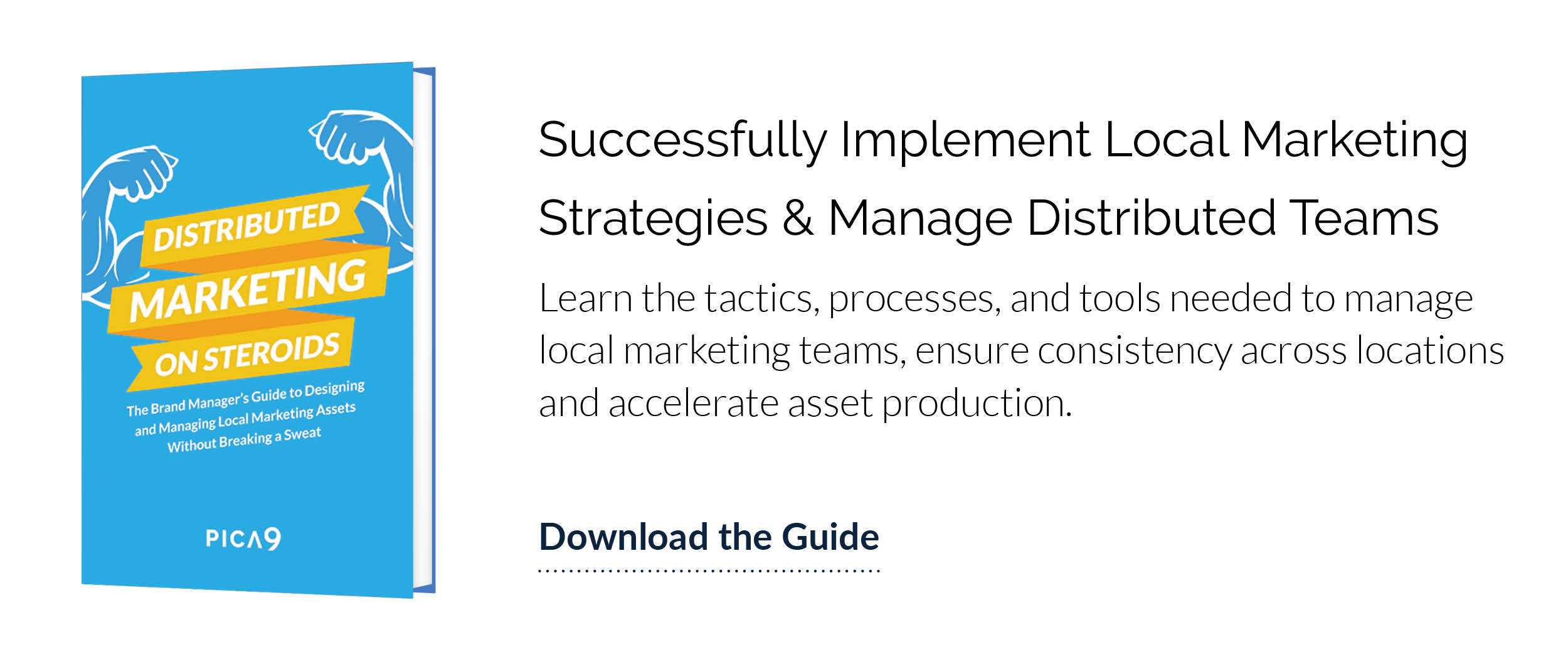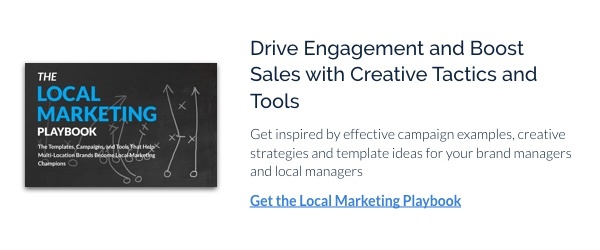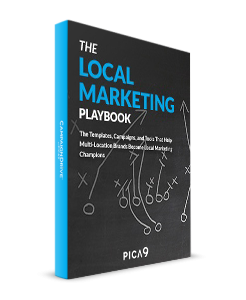Many of the world’s most successful organizations have unlocked the secret of scaling up. Franchises like McDonald’s, 7-11, and The UPS Store have figured out how to maximize their profitability with business models that can be easily replicated at tens of thousands of locations worldwide. For brand managers at multi-location brands who are responsible for offering marketing support to a geographically-diverse network of local affiliates, these brands are an inspiration. But they also point to the many challenges that are related to effectively scaling marketing resources across your vast network.
Why Multi-Location Brands Should Focus on Scaling Up vs. Growth
Brands with multiple locations must focus on scaling their operations in order to achieve the growth that they are aiming for. Growth is what you are trying to achieve — it's an increase in revenue or profits. Scaling is about taking your business operations everywhere within your network. Franchising, and operating in a distributed way, provides a foundation for scaling: for every new franchise your organization signs on, you may be able to unlock thousands of new local customers. As distributed brand marketing managers work to support and grow their affiliate network, scaling is a concept that’s top-of-mind for many industry leaders. In an upcoming survey of C-level executives for distributed brands, our research revealed that:
- On average, CMOs believe that growth in their franchise/dealer/local affiliate network will accelerate over the next five years.
- Operational efficiency (cost savings and time to market) is the third-most pressing concern for 52% of CMOs.
- 9 out of 10 CMOs will invest in marketing operations technology in the next 12-18 months because existing tools cannot support the brand.
Brand managers know that to support their brand’s profitability in today's environment they need to help local affiliates deliver a great customer experience at all every location. At the same time, they recognize that achieving operational efficiency, including implementing a technology to help with distributed marketing, is critical to scaling up.
Unlocking technologies that are designed to scale marketing support across the entire affiliate network — like Local Marketing Automation Software — is one of the keys to delivering consistently excellent local marketing at distributed brands.
To boost your local marketing results, get the free ebook: Distributed Marketing on Steroids
Why Local Marketing Automation Software Supports Operational Efficiency
In a sense, the single biggest challenge facing the marketing teams at multi-location brands is the question of scale. With a decentralized network of franchisees and dealerships, you’re supporting business owners who often lack the knowledge, desire, and time needed to do great marketing. 54 percent of brand managers report struggling with “decentralized tools” in their affiliate networks — widely varying technologies lead to further confusion and inconsistencies in local brand experience.
Local Marketing Automation Software (LMA) is a technology that allows multi-location brands to create, store, localize, manage, and measure local marketing across multiple channels (print, digital, email, web content, and more). LMA is generally owned and managed by the brand team and used by local affiliates to create customized marketing assets for local audiences through the use of brand-compliant templates.
LMA is designed to be an all-in-one system for local marketing where head office teams can centralize many different kinds of local marketing technology into one easy-to-use tool. The main objective of platforms like this is to enable local users to deliver consistent customer experiences at their locations. Local affiliates are able to use the tool to produce custom marketing collateral, on demand. Brand managers benefit from better insight into marketing activity at the local level through data analysis tools and can communicate more efficiently with local affiliates.
LMA supports operational efficiency by allowing multi-location brands to support local marketing success from a single platform, eliminating the need for costly and confusing software expenditures, one-off design requests from local affiliates, and manual compliance monitoring. Better yet, LMA acts as a powerful baseline for scaling marketing resources, and ultimately, the entire brand.
How Local Marketing Automation Software Helps Multi-Location Brands Scale Up
Local Marketing Automation is all about scale. A multi-location brand manager's success depends entirely on scaling marketing support across distributed storefronts, dealerships, or retail locations. LMA supports smart, cost-effective growth by helping headquarters teams scale their marketing assets, internal resources, and operating budgets to the whole local affiliate network. Here’s how:
#1: Scaling Marketing Technology
What’s the opportunity cost of not using a single tool for local marketing that supports easy marketing execution at the local level? For many brands, using a portfolio of marketing technologies or allowing local marketers to choose their own marketing software can result in inconsistent local marketing execution and poor brand consistency.
54 percent of marketers note that redundant tools are a top challenge. Local affiliates may struggle to make time for marketing while balancing competing priorities as small business owners. Without centralized technology and tools, the quality of local marketing is often lower as affiliates struggle to create customized materials that appear professional.
Technology like Local Marketing Automation allows headquarters to provide access to marketing materials and campaigns across affiliate locations by making it easy for locals to log in, find the needed materials, and execute marketing in the tool.
#2: Scaling Internal Resources
Local Marketing Automation software enables multi-location brands to avoid a backlog of requests and revisions from locals and allows the head office design team to work on innovative concepts that move the brand forward. Templates allow designers to create a standard layout, which can then be customized with unique content at the local level. With the ability to lock and unlock template fields, brand managers ensure that local affiliates are releasing compliant print and digital advertising without having to get involved in reviewing each and every ad that goes out.
By making professional-looking, compliant designs easy for affiliates, LMA allows brand design teams to create assets at scale across multiple locations. Instead of focusing on responding to time-consuming requests for help from local affiliates, designers can dedicate their time to creating new designs and templates that expand the brand’s collection of local marketing assets.
#3: Scaling Marketing Budgets
By increasing the efficiency of the headquarters team and local affiliates, LMA software has the potential to help brands scale their marketing budgets. From the CEO’s perspective, return on investment (ROI) is one of the most important metrics to evaluate marketing's effectiveness. With technology to improve operating efficiency, multi-location brand representatives can use their budgets in ways that more directly lead to sales.
When your headquarters team is able to more efficiently create and reuse marketing assets, wasted budget is cut down. Brand managers are empowered to reevaluate their strategy and direct resources towards higher-impact investments like:
- More effective distribution strategies for national/international brand advertising campaigns
- Superior advertising placements with greater exposure
- Better-quality local marketing assets, based on data-driven insights
When brand management teams are able to create more assets, or distribute assets in a way that leads to more sales, LMA provides a gateway to help expand marketing dollars and improve the ROI of all kinds of campaigns, not just local ones.
For in-depth insights, we recommend 22+ Ways Local Marketing Automation Software Increases Marketing ROI.
#4: Scaling Local Affiliate Networks
When brand managers are able to better leverage marketing support and resources across locations, they have time to take a more strategic view that can help propel the brand forward. With an LMA tool in place that allows headquarters teams to provide higher-quality support to local affiliates with fewer one-off requests and better local results, brands are in great shape to support expansion.
For many distributed brands, scaling the network involves onboarding new local affiliates and getting them up and running smoothly. For the many CMOs who believe that their network will grow over the next five years, LMA adoption may be key to achieving growth goals.
Scaling the Brand: The Right Software for Better Local Marketing
Your multi-location brand may be built to scale up to a global network of franchises, dealerships, and storefronts, but are your marketing technologies built for scaling too? If your technologies don’t make it simple for local affiliates to execute professional local marketing, they could result in wasted resources or poor-quality local marketing results.
Industry-leading enterprise brands are 15x more likely than average firms to invest in SaaS-based local marketing automation software. As brand marketing managers work to improve their customer experience at locations worldwide, all-in-one solutions that are designed for multi-location marketing challenges provide critical agility and efficiency.
Did you know that SaaS LMA helps major distributed brands like Marriott, Melting Pot, and Polaris efficiently execute marketing at scale? Learn how they’ve achieved better profitability with technology and templates in The Local Marketing Playbook: The Templates, Campaigns and Tools.





